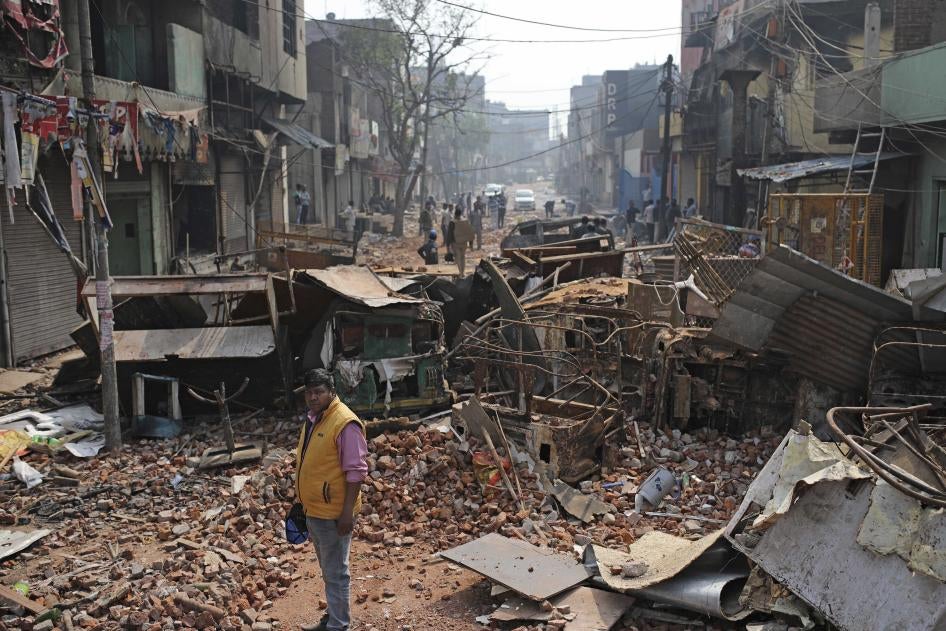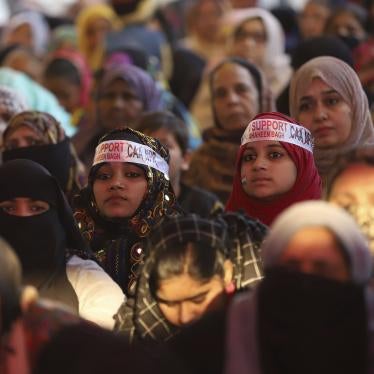(New York) – Indian authorities are wrongfully prosecuting activists and protest organizers under India’s anti-terrorism law two years after 53 people were killed in communal violence following peaceful protests against discriminatory citizenship policies, Human Rights Watch said today.
The authorities should immediately drop politically motivated charges and release the 18 activists and others detained. People responsible for abuses should be appropriately prosecuted, including supporters of the ruling Bharatiya Janata Party (BJP)-led government who instigated the communal violence and police officers who did not impartially enforce the law.
“Indian authorities have been targeting activists for harassment and arrest instead of impartially investigating allegations that BJP leaders incited violence and police officials were complicit in attacks,” said Meenakshi Ganguly, South Asia director at Human Rights Watch. “The authorities should prosecute those responsible for the violence and stop using these investigations to silence critics of the government.”
The government’s adoption of the discriminatory Citizenship Amendment Act (CAA) in December 2019 led to weeks of peaceful protests across India. The citizenship law fast-tracks asylum claims of non-Muslim irregular immigrants from the neighboring Muslim-majority countries of Afghanistan, Bangladesh, and Pakistan. Coupled with the government’s push for a nationwide citizenship verification process through a National Population Register and a proposed National Register of Citizens, aimed at identifying “illegal migrants,” it has heightened fears that millions of Indian Muslims could be ripped of their citizenship rights and disenfranchised.
Several top BJP leaders dangerously derided the protesters, and some openly called for violence against them. On February 23, 2020, after a local BJP leader, Kapil Mishra, called for forcibly dispersing protesters, many of them Muslim, BJP supporters gathered in the area, leading to clashes between the groups.
Hindu mobs, armed with swords, sticks, and bottles filled with gasoline, targeted Muslims in several neighborhoods in northeast Delhi, burning their homes, shops, mosques, and property. Forty of the 53 people killed in the violence were Muslim; a policeman and a government official were among the Hindus who died.
Police investigations into the riots have been marked by bias, delays, inaccuracy, lack of proper evidence, and failure to follow proper procedures, Human Rights Watch said.
The Delhi police filed 758 First Information Reports – police registrations needed to begin criminal investigations – into the riots. But two years later, according to a report filed by the police in the Delhi High Court, investigations are pending in over half the cases. Only 92 cases have reached trial. In a number of cases, judges have called out the Delhi police for delay in investigations, for failing to heed court orders, or for failing to appear in court.
In several cases, judges have said that the police investigations into the riots were “shoddy,” “callous,” or “farcical.” In September 2021, a Delhi court discharged three Muslim men accused of looting and vandalizing a shop owned by a Hindu man, citing failure of the investigating authorities to conduct a proper investigation. Judge Vinod Yadav called the investigation callous and indolent, saying that this was true of many other Delhi riot cases being brought before the court. “A lot of time of this Court is being consumed by the cases like the present one, where there is hardly any investigation carried out by the police,” he said. A month later, Judge Yadav, who had made a number of critical observations into the police conduct in the Delhi riot investigations, was transferred for unreported reasons.
The independent Delhi Minorities Commission conducted an investigation that found that the violence was “planned and targeted” and that some policemen actively participated in the attacks on Muslims. In a video that became emblematic of police anti-Muslim bias during the riots, several policemen are seen forcing five grievously injured Muslim men lying on the street to sing the Indian national anthem to “prove their patriotism.” The police then detained them. One of the men, Faizan, 23, died from his injuries two days later. Two years later, an investigation is still pending, and the policemen responsible for custodial violence have not been prosecuted or punished. The authorities have yet to investigate other allegations of police complicity in the violence.
In contrast, the Delhi police have filed politically motivated charges against 18 activists, students, opposition politicians, and residents – 16 of them Muslim. The police cases rely extensively on disclosure statements that are suspiciously similar and WhatsApp chats and social media messages about organizing and announcing peaceful protests. The police have presented this as evidence of complicity in a larger conspiracy to defame the Indian government started by organizers of the protests against the Citizenship (Amendment) Act.
The authorities have filed charges under the draconian Unlawful Activities (Prevention) Act, related to unlawful activity, terrorist funding, and planning and committing acts of terrorism. They have also accused protest organizers and activists of sedition, murder, attempted murder, promotion of religious enmity, and damage to public property, among other alleged offenses. All those charged have been critical of the BJP government and the citizenship law. They include members of Pinjra Tod, an autonomous collective of women students; United Against Hate, a group that works to protect religious minorities; and the Jamia Coordination Committee, which led the student protest at Jamia Millia Islamia University.
In June 2021, the Delhi High Court, in granting bail to activists Natasha Narwal, Devangana Kalita, and Asif Iqbal Tanha, said the police had failed to produce any evidence to show that the accused had committed a terrorism-related offense. The court added, “that in its anxiety to suppress dissent and in the morbid fear that matters may get out of hand, the State has blurred the line between the constitutionally guaranteed ‘right to protest’ and ‘terrorist activity.’ If such blurring gains traction, democracy would be in peril.”
The United Nations High Commissioner for Human Rights, Michelle Bachelet, has raised concerns over the Indian government’s use of the Unlawful Activities (Prevention) Act against human rights activists. Several UN human rights experts have called for the immediate release of activists arrested for protesting against the Citizenship Amendment Act.
“Delhi police investigations into the 2020 violence point to the reasons for the lack of trust in the police in India and the urgent need for police reforms to combat communal bias and other problems,” Ganguly said. “The failure to hold people responsible for communal violence to account will only fuel further abuses against religious minorities.”








